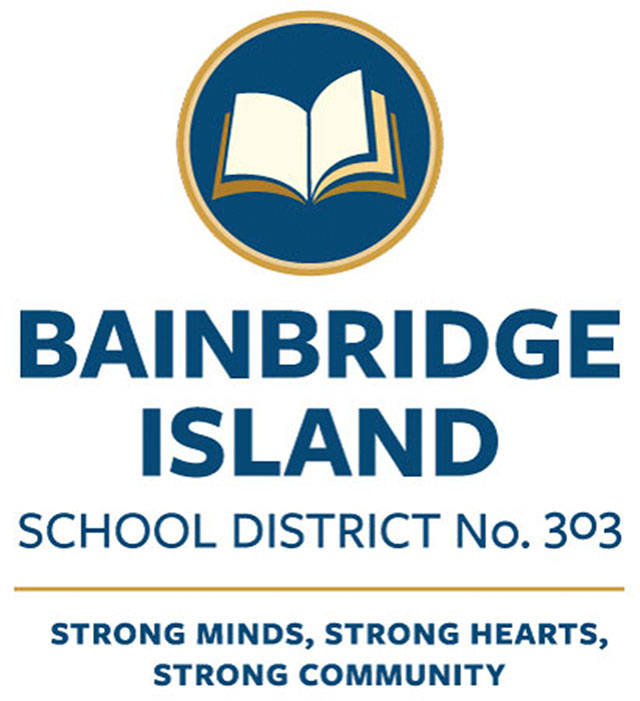Despite the Bainbridge Island School District being down 200 students – meaning getting $2 million less from the state – the local tax rate for the BISD actually will go down.
Dave Trageser, senior vice president for D.A. Davidson & Co., explained to the school board recently that the levy rate officially to be decided Thursday night would go down from $2.70 to $2.61 per $1,000 valuation, including enrichment, technology, capital and debt.
But when state taxes are added, the cost goes from $5.51 to $5.67 per $1,000. With the median home price on the island valued at $787,680, that means $2,124 for the local levy. To compare, Trageser said taxpayers will pay $1,062 in North Kitsap and $2,911 in Issaquah.
Trageser said the rate would go down if there is new construction, but added Bainbridge Island is the lowest area in Kitsap County for growth. He said the tax in the future would grow 1% a year. That would bring a slight increase in money as valuations grow.
With so much unknown because of COVID-19, BISD superintendent Peter Bang-Knudsen was asked if Feb. 9 might be too soon for a levy vote. He said there was discussion with staff about that.
“If we push it to April when COVID is down a bit people might feel better” about approving a levy, he admitted.
However, if the levy fails the next opportunity for a vote would be April 27. That leaves a short window to come up with a budget in May when teachers need to know about their contracts. And if the district waited until April for a first vote, if it failed then the district would have to wait until August for another vote, when many teachers would be gone because they didn’t have contracts.
Plus, “Historically we have had great success in February” levies, Bang-Knudsen said, adding 10 schools passed levies Nov. 3 despite COVID, so that’s a positive trend.
Meanwhile, Trageser showed comparisons with other school districts.
“We’re kind of right there in the middle,” school board member Mark Emerson said. “It’s not some crazy reach number.”
Board president Lynn Smith added, “It was higher a few years ago.”
Board member Mike Spence asked Trageser what would happen if there is a recession?
After hearing that if home valuations go down then the tax rate just goes up, Reece realized, “So taxes are going to stay the same.”
Bang-Knudsen also talked about the need for the enrichment levy to pass. The name was changed by the legislature. It used to be called the education, programs and operations levy. “It covers the gap between what the legislature funds and what we determine our needs are,” he said.
For example, the state would fund one nurse for the entire district who would work half-time two days a week and try to cover all the schools. BISD, instead, has hired a nurse for each school.
That levy would remain at about $1.05 per $1,000 valuation, going up a penny or so in following years.
The money also goes for counselors, music, student support, special education, sports and more. It also keeps class sizes down. The state provides funds for that for K-3, but that’s it. BISD likes to keep class size down as much as it can at every level.
BISD looks at the whole child through an equity lens. “We provide a world-class education,” Bangs-Knudsen said.
As for the drop of 200 students in enrollment, probably mostly due to COVID, Bang-Knudsen said, “We hope to bring some of those families back.”
If they do, “Reductions (in the next budget) would be much narrower.”
An advisory committee will start meeting in December to discuss the budget. Staff will need to be cut due to the lower enrollment, but if we “don’t have the levy (pass) it gets to be catastrophic,” the superintendent said, with programs, electives and counseling among the areas eliminated.
The school board also talked about a technology levy. That levy would remain in the about 26 cents per $1,000 range.
Bang-Knudsen said a three-year levy would last until 2024. That would be a better time to renew than 2025, when the capital levy runs out and another is likely. He said it’s better to stagger money issues than vote on them simultaneously.
Plus, along with the coronavirus, there are other uncertainties. The levy cap could be raised, enrollment could change and the economy could be in flux.
Kiyo Toma, director of technology services, said the state doesn’t help with technology funds, and it’s a vital part of education, especially with kids home learning due to COVID and who knows how long that will last? The money pays for student devices, staff development and more.
He said technological literacy is an expectation of higher education and for going into the workforce.
“There is a huge amount of expectations,” he said, adding kids need to know how to use social media and analytics in many jobs. “Technology is shaping the job market.”
And while COVID has forced technology to advance in an urgent situation, he said once there is time to step back society will learn new things to improve upon. “There are probably some things we want to keep,” he said.
School board vice president Christina Hulet asked if the district should ask for even more money for technology.
Becauser of the unknowns already mentioned, Bangs-Knudsen said they want to keep that levy flat. But there’s always something more that could be done – such as having more expertise in training.
“They have dedicated people on the Seattle side” for that type of instruction,” Toma said. “You could argue this (tech levy) lacks ambition. But it’s realistic.”



